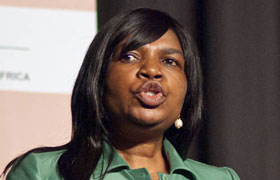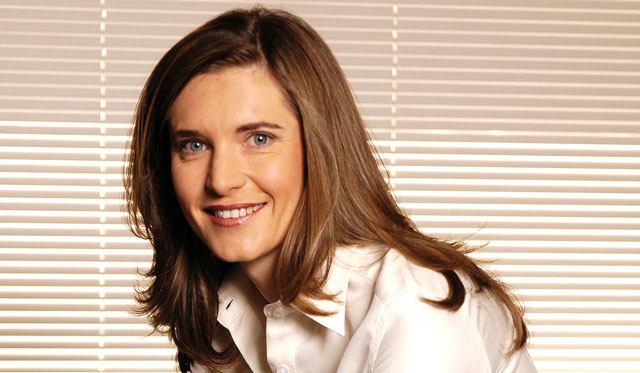
Communications minister Dina Pule is “surprised” by e.tv’s high court application against her in which the free-to-air broadcaster accuses her of acting unlawfully in appointing Sentech to manage the control system that will be used in the set-top boxes that are needed for consumers to receive digital terrestrial television signals.
“The minister is surprised by this application, which seems to be aimed at [making] technical [and] legal points, probably at the expense of digital migration, with the risk that SA may be bogged down [in] legal battles and [fail] to meet its deadline in terms of its international commitments,” says communications department director-general Rosey Sekese in an answering affidavit filed at the high court in Johannesburg this week.
SA must complete its migration to digital television by no later than June 2015 if it’s not to be in breach of commitments made to the International Telecommunication Union (ITU).
In a founding affidavit filed last month, e.tv chief operating officer Bronwyn Keene-Young accuses Pule of exercising powers she doesn’t have when she appointed state-owned Sentech – and by extension conditional access technology supplier Nagravision – to be the party responsible for managing the set-top box control system.
The control system, also known as the conditional access system, will ensure compliance with a minimum set of specifications for set-top boxes and prevent grey imports. Only those boxes that comply with minimum specifications will be able to decode the country’s digital broadcasts. Individual set-top boxes will also be able to be switched off, preventing the use of stolen boxes.
Keene-Young argues that “no piece of legislation confers upon the minister the power to determine that Sentech be responsible for managing the set-top box control system”. Among other things, e.tv is concerned that Sentech will be able to set the price for access to the control system and argues that the costs would “significantly exceed” the costs if e.tv and the SABC were to manage the control system themselves, as originally proposed.
However, Sekese hits back at e.tv in her answering affidavit, defending Pule’s decision and arguing that the minister was entitled to make it under section 231 of the constitution, which deals with the responsibilities of the national executive in negotiating and signing international agreements.
“It will be submitted … that all agreements by member states of the ITU are agreements referred to in section 231(3) of the constitution,” Sekese says. “They do not require any ratification. Nor do they need to be enacted into any law by national legislation.
According to the answering affidavit, an “in-house conference of stakeholders” held in Cape Town in 2011 concluded that the control system for set-top boxes would be procured by “the broadcasters” (e.tv and the SABC) and managed by Sentech.
“It is clear from the minutes … that the consensus of the participants in the in-house conference was that the broadcasters would procure the set-top box control system and that the management of the system would be [handled] by Sentech,” Sekese says.
Her affidavit does not say which parties attended the conference or whether the decisions made were binding.
She insists Pule’s decision to make Sentech the manager of the control system was taken to reduce costs and expedite the move to digital television.
“On realising that the existing system at Sentech met the requirements needed for the digital television project and that a completely new system was not required, and that this would be more cost effective and time efficient for the government, the minister then instructed Sentech to assume responsibility for the control system and to ensure that the project timelines were maintained.”

According to Sekese, Pule was told by her advisers that the cost of acquiring a new control system would be about R35m, whereas upgrading Sentech’s system would cost “no more than R7m”, including maintenance costs. Sentech has the “experience and skills to operate the existing system”, meaning there would a “saving on training costs”.
One of the grounds on which e.tv is opposing Pule’s decision to make Sentech the manager of the control system for digital television is that the signal distributor has experienced serious security problems with the encryption of its Vivid satellite platform.
“E.tv has direct experience of Sentech’s mismanagement of this system and, had it been given the opportunity to do so, would have placed evidence of this before the minister to contend that Sentech is plainly ill-equipped to managed such a system in the present context.”
However, in her affidavit Sekese says there is nothing that compels either e.tv or the SABC not to use their own control system. “If they do desire, they can still procure their own set-top boxes and distribute [these]. Another alternative is that the [government]-subsidised set-top boxes contain hardware for other control systems in addition to Sentech’s control system, but for the account of the party requesting the inclusion of such hardware.
“Consequently, nothing stops the SABC and e.tv from continuing with their tender and appointing their own vendor for a set-top box control system, provided such a control system will be used in their own, non-subsidised set-top boxes or, alternatively, that they pay the cost of inclusion of their control system hardware in the subsidised set-top boxes.”
E.tv is expected to file a replying affidavit to the court next week. — (c) 2012 NewsCentral Media




